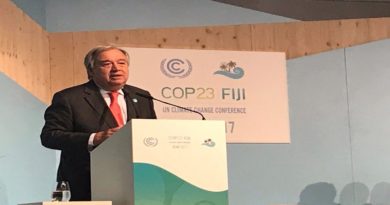World Health Day: Group calls for urgent global action against PFAS, microplastic pollution
In commemoration of World Health Day on Sunday 7 April 2024 , Bluewater, a global leader in water purification and beverage solutions, calls on governments worldwide to tackle the urgent issue of PFAS (Per- and Polyfluoroalkyl Substances) and microplastic contamination in drinking water.
PFAS, a family of man-made chemicals used since the 1940s, are known for their persistence in the environment and the human body, potentially leading to adverse health effects. Microplastics, minuscule particles of plastic less than 5mm in size, have also been detected in drinking water from the tap and single-use plastic bottles, posing a potential risk to human health.
Bengt Rittri, Founder and CEO of Bluewater, states, “There are thousands of different PFAS, some more widely used and studied than others. The fact that many of these substances break down very slowly is alarming. It’s unacceptable that these contaminants are present in our water, soil, air, and food. It’s time the producers of PFAS chemicals and throwaway plastic bottles are held accountable for the toxic mess they have created across our beautiful blue planet.”
Scientific research suggests that exposure to certain PFAS may lead to adverse health outcomes, including developmental effects or delays in children, low birth weight, and even cancer. PFAS and microplastics are not only a threat to human health but also to the environment and are now widely found in our water, soil, air, food, and even in materials found in our homes or workplaces.
The reality behind such realities was underlined by an investigation by Bluewater in March 2024 at locations across the sprawling British capital, London, and Stockholm, the Swedish capital, that revealed worryingly high levels of toxic PFAS in municipal tap water.
Bluewater is raising awareness about these issues and actively working to combat them. The company has developed and sells highly innovative water purification technology verified to remove toxic PFAS chemicals and microplastics. Bluewater’s compact, under-sink purification technology also eliminates the need for plastic bottles, further reducing plastic pollution.
This spring, Bluewater launched its ground-breaking Kitchen Station 1™ water purification system in Europe that removes up to 99.97 percent of toxic chemicals and other contaminants. Designed to allay consumer fears about tap water quality, the compact Bluewater Kitchen Station ensures drinking and washing water is squeaky clean while adding a unique blend of liquified minerals harvested from age-old northern Swedish mountains for enhanced health.
“We’re not just in the business of providing clean water; we’re committed to promoting sustainable practices, improving water quality in local communities, and advancing environmental conservation efforts,” Rittri adds.
Since its founding in 2013 in Stockholm, Sweden, Bluewater has made it its mission to provide clean, purified drinking water enriched with Swedish minerals and natural extracts. The company advocates for a plastic-free world and promotes reusable bottles.
“In our commitment to a cleaner, healthier world, Bluewater is urging governments to act to reduce PFAS and microplastic contamination,” said Bengt Rittri, an acclaimed Swedish environmental entrepreneur. The company firmly believes that everyone has the right to clean, safe drinking water and is dedicated to making this a reality around the planet, from Europe and North America to China, Southeast Asia, the Middle East, and Africa.
According to the United Nations “the world is drowning under the weight of plastic pollution, with more than 430 million tonnes of plastic produced annually. Two-thirds are short-lived products that soon become waste, filling the ocean and, often, working their way into the human food chain”.
A scientific study published in Lancet Planetary Health by researchers at Aberdeen and Örebro Universities provides evidence that fetuses exposed to PFAS have altered metabolism and liver function even before birth, potentially increasing the risk of metabolic diseases, such as diabetes, in adulthood.




